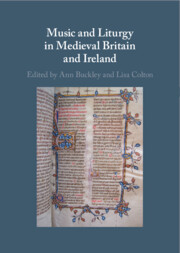Book contents
- Music and Liturgy in Medieval Britain and Ireland
- Music and Liturgy in Medieval Britain and Ireland
- Copyright page
- Contents
- Figures
- Tables
- Music Examples
- Contributors
- Acknowledgements
- Abbreviations
- Part I
- Part II
- Part III
- 10 Case Studies II: Textual Witnesses to Insular–Continental Networks
- 11 Nation, Identity, and the Liturgical Cult of St Katherine of Alexandria in Twelfth-Century England
- 12 The Dominicans and Their Identity in Medieval Britain and Ireland
- 13 Liturgy and Devotion in Insular Witnesses to the Cult of the Three Kings of Cologne
- 14 Epilogue
- List of Manuscripts
- Bibliography
- Index
11 - Nation, Identity, and the Liturgical Cult of St Katherine of Alexandria in Twelfth-Century England
from Part III
Published online by Cambridge University Press: 23 December 2021
- Music and Liturgy in Medieval Britain and Ireland
- Music and Liturgy in Medieval Britain and Ireland
- Copyright page
- Contents
- Figures
- Tables
- Music Examples
- Contributors
- Acknowledgements
- Abbreviations
- Part I
- Part II
- Part III
- 10 Case Studies II: Textual Witnesses to Insular–Continental Networks
- 11 Nation, Identity, and the Liturgical Cult of St Katherine of Alexandria in Twelfth-Century England
- 12 The Dominicans and Their Identity in Medieval Britain and Ireland
- 13 Liturgy and Devotion in Insular Witnesses to the Cult of the Three Kings of Cologne
- 14 Epilogue
- List of Manuscripts
- Bibliography
- Index
Summary
This chapter seeks to provide an explanation for the earliest Insular cult of St Katherine of Alexandria, which grew in popularity despite the absence of primary relics or an Insular pilgrimage site. Knowledge of St Katherine likely arrived in England prior to 1066, but her cult achieved widespread appeal following the Norman Conquest. This chapter proposes that this appeal was rooted in the congruencies between aspects of St Katherine’s character, which can be conceived of as generally ‘civilised’, and descriptions of ‘Englishness’ that rested on a conception of a cultural, rather than biological, national community. These depictions are evident in the circulating historical chronicles written during the twelfth century, which amalgamated English and Norman identities and differentiated the ‘English’ nation from its ‘barbarous’ neighbours. These same characteristics find expression in the vita of St Katherine and were highlighted liturgically, through music and text, testifying to their valence.
Keywords
- Type
- Chapter
- Information
- Music and Liturgy in Medieval Britain and Ireland , pp. 242 - 268Publisher: Cambridge University PressPrint publication year: 2022

